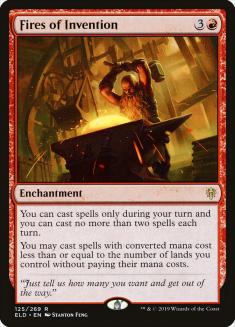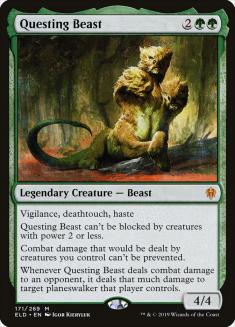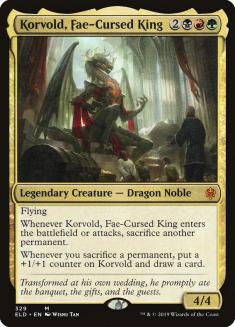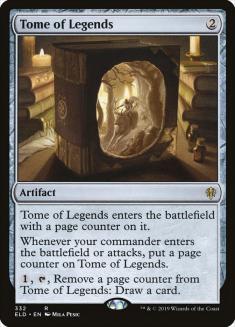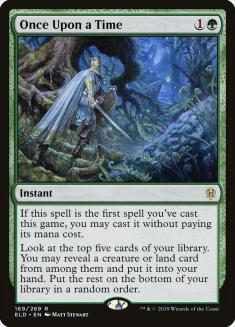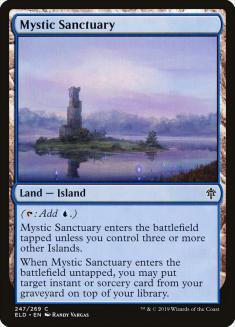Look, I’m just going to put my present relationship with Magic out in the open. I’m straight-up not having a good time.
I try desperately to be a positive person. I’m not going to pretend I’m always successful, but I truly do believe that my life is better when I make a conscious effort to look on the bright side of things and focus on the things I can control. This was historically reflected in my approach to Magic.
I leaned staunchly anti-ban talk, instead trying to focus on things I could do to adapt to problematic cards. If I felt truly defeated, I would leave the confines of a stagnant Standard and go find another format that I did enjoy. There were always different forms of Magic to be played and I loved the game too much to remove it from my life.
However, the last year-and-a-half feels different. Every format is infested with a barrage of Magic cards that I do not enjoy playing with or against.
- Teferi, Time Raveler
- Veil of Summer
- Oko, Thief of Crowns
- Uro, Titan of Nature’s Wrath
- Lurrus of the Dream-Den
Misstep after misstep consuming not only Standard, but every other format as well. When Aetherworks Marvel made Standard miserable, I escaped its games of random chance by retreating to beloved Delver of Secrets mirrors in Legacy. Where do you go if you don’t care for the multitudinous cards that emphasize a snowballing playstyle, invalidating the traditional ebb and flow that defined the game of Magic for decades? You are not escaping Uro. Or you are. Over and over. You get what I mean.
I do see the appeal of Lurrus of the Dream-Den in the short term. The games of Magic it inspires in Modern and Pioneer are usually solid, if overly contemplative of the companion. But am I just supposed to ignore the fact that Lurrus is here forever, and building a fair eternal deck without it (or, to a lesser extent, Yorion) will almost always be a mistake until the end of Magic? Folks suggest that the answer is more companions, and while I understand this argument, are we sure that this is what is already on the docket?
After all, there’s a huge amount of lag time between a card’s creation and its arrival in reality. If Wizards of the Coast (WotC) underestimated companion’s impact on eternal formats, there may not be relief coming for an awfully long time. And who knows if more companions even benefit the game long term? It is an irreversible alteration to the game that I believe was taken far too lightly.
Sorry. I honestly don’t mean to rehash the arguments about companions that have played out all over Twitter for the last few weeks. For the most part, I accept that these cards exist, and I acknowledge the difficulty in balancing each individual Magic card. If Lurrus and Yorion both lose a point of power and toughness, does this whole quagmire just go away because the cards aren’t good enough for eternal play anymore? The answer is probably no, but there is a power level threshold where the argument against all the aforementioned cards becomes either entirely moot or one of temporary concern because they will only impact Standard. The problem is that this threshold is routinely being missed at this point. This suggests to me that there are broader systemic issues at play surrounding the design of Magic cards. These issues stem from some correct assumptions that have been carried to incorrect conclusions.
Let’s talk a bit about the necessary qualifications to speak on systemic issues in Magic. There’s an argument that an outsider to WotC and someone who has never designed a Magic card in his life should probably sit back, shut up, and leave this work to the professionals. So allow me to share a story about my past life.
When you begin your first year of law school, you take a pretty set slate of classes. Torts, Contracts, Constitutional Law, Criminal Procedure, Civil Procedure, Property, and some type of legal writing are the focus. In most instances, your entire grade in these classes is decided by a single test. I am a good test taker. I also figured out early on that what was going on in law school classrooms was irrelevant. The only thing that mattered was your grade on the test. I stopped briefing cases, stopped reading most case law, and just started preparing for the tests basically as soon as my first semester started.
I did very well my first year. Law firms hire for summer internships after the first year of classes, and your opportunity to interview is decided by class ranking. I got to interview with my choice of firms, and probably since I am comfortable talking and look decent in a suit, I landed a summer internship with a top firm. The thing about summer internships at top law firms is that they basically always lead to an offer of full-time employment upon graduation. I am not being hyperbolic. Offer rates stemming from summer internships at top firms are almost always 100% barring cataclysmic situations like the one we are presently facing.
So, I was offered a post-graduation job at a top firm. On the back of a few tests. Nothing I did in my legal career ever remotely referenced anything I learned in those first-year classes. I worked on litigation of tremendous scale and importance, trying my best to learn absolutely everything on the fly. I got by. There was nothing about my knowledge base that prepared me for what I was doing. But to clients, family, and friends, I was a big-shot lawyer. Really all I had was some vague foundational knowledge and an opportunity to sink or swim.
My point in all of this is that as an outsider, it’s sometimes hard to see that people in the roles we regard with reverence or importance are often just regular folks who caught some breaks and ended up in a position that demanded the world of them. We are all both simultaneously qualified and unqualified for everything we set out to do. We hold Schrodinger’s Degrees.
This brings me to two conclusions:
First, the people who work for WotC are doing their absolute best. They love the game more than anyone, and all they want is for us to have fun playing it. They are brilliant, ceaselessly creative, patient, and in several instances, good friends. Miss me with any talk that so and so needs to be fired. It’s simultaneously callous and ignorant, and you will never find me a receptive audience to these takes. There are unseen pressures that none of us understand, and budget, staffing, corporate oversight, temporal demands, and a billion other factors are never going to be adequately considered by an outsider.
It is my sincere hope that the individuals at WotC know that taking criticism of a product that so many people have a hand in and internalizing as a referendum on the individual job you have done is neither healthy nor logical. That being said, I do it all the time. When people say negative things about Star City Games, especially when the things they say are based on incorrect assumptions, I get upset. I think this is a natural reaction when you believe in the work that you do for a company.
All I personally can do is ask WotC folks for forgiveness. My criticisms come from a place of shared love for Magic, and a desire to see things improve. I hope the stewards of Magic know I hold them in high regard, and my disagreement with the current path of the game comes from a place of respect for what they have accomplished in the past 27 years, and what they are capable of accomplishing in the next 27 years.
My second conclusion is that my decades of obsessive thought about Magic probably have left me far more qualified to opine on these topics than I ever was to opine on legal issues. This doesn’t mean I know a fraction of what the folks at WotC do. But I think their job has some of the same elements of a mad scramble that legal work does. Your clients are impossible to please. You’re constantly facing situations and limitations that nothing has prepared you for. I’ve put together my foundational Magic knowledge, and I’m taking it upon myself to leap into the deep end. You can judge if I sink or swim.
I acknowledge the fact that I’m going to make a lot of assumptions about what WotC thinks. There’s a very good chance my interpretations are either dramatic oversimplifications or just simply wrong. I’m also working with a magic wand that can just be waved to change corporate initiatives and logistics at a whim.
This is meant to be a thought exercise that has an outside chance of inspiring a little discussion, either in the community or among stakeholders. To break the fourth wall a bit, it’s also designed to be an engaging framework for readers while functioning as a vehicle to spout off the random thoughts about Magic that spend way to much time bouncing around my head. If you take it too seriously and think I’m actually suggesting that WotC turn around and implement all of this tomorrow, you’re going to have a bad time. It is my attempt at creating a plausible explanation for how things went wrong, and how they could potentially get better.
Flawed Conclusion #1
- Increased power level generates player excitement.
Correction #1
- Increased power level generates player excitement now but is trading against future equity.
After the banning of Oko, Thief of Crowns, WotC published “Play Design Lessons Learned.” In it, they described the F.I.R.E. philosophy, which dictated that “Magic should be . . . Fun, Inviting, Replayable, Exciting.” This article also stated that “Standard is more fun at a slightly higher power level. It’s easier to make cards relevant to more players without making bizarrely engineered cards laser-focused on a specific niche that may or may not get there.”
A lot of folks write off the F.I.R.E. philosophy as meaningless corporate jargon, and even if I understand the criticism, it’s never held a lot of weight with me. 99% of what we say can be cast aside as imprecise attempts to capture internalized feelings, and if F.I.R.E. works as mnemonic to remind the team what their overarching goals are, I don’t really object to its nebulous nature.
I do take staunch exception to the second quote. Why is Standard more fun at a slightly higher power level? I agree that it’s easier to make cards relevant to more players if they’re pushed, but easier does not equal better. More than that, cards seem to default to the same tricks to add to their default power level. Doubling and tripling mana has been a staple of casual formats forever, but did we need to do it a half-dozen times in the present Standard format? Does slapping two or three extra abilities on every card really make the play experience that much better?
Similarly, are we sure that “bizarrely engineered cards laser-focused on a specific niche” are a bad thing? Looking through this Twitter thread of people’s favorite Magic cards, I’m not so sure.
I’ll be honest, though. I was excited reading the previews for the most recent sets. Damn excited. But a lot of that excitement hinged on a belief that surely there was something I didn’t know:
- After careful work to narrow planeswalkers, there’s no way a set focused on them is going to throw all of that out the window and make the game hyper-focused on the card type again. (War of the Spark)
- There’s no chance that a free cantrip would have been printed without careful vetting. (Once Upon a Time)
- A three-mana planeswalker that starts on six loyalty and is the face of the set would obviously be carefully balanced. (Oko, Thief of Crowns)
- A functional reprint of Yawgmoth’s Will must be harder to benefit from than it appears at first glance. (Underworld Breach)
- You’re not going to add an eighth card to players’ hands unless the drawbacks are really challenging to comply with. (Companions)
I gave the benefit of the doubt time after time. I was burned again and again. I’m not excited anymore. I’m trepidatious.
Also, what is the consequence if you’re wrong, and more powerful doesn’t automatically equal more fun? Well, obviously bannings and the controversy and the erosion of consumer confidence that come with them are one consequence. The erasure of 25 years of Magic cards that simply can’t compete with the present power level is another huge tragedy. But most damning is the possibility that you will have to scale back power to make the game enjoyable. Magic players have an addiction to power, and it is amplified in players who do not have to consider the balance of a tournament scene or who are new to the game.
Efforts to up the power level of Standard should have been gradual, and the impact carefully measured. Now we have reached a place where Modern players bemoan the turnover of their favorite decks, and Legacy players have had to shelve their nostalgic favorites that have kept them anchored to the format. All for a Standard that has felt woefully unpopular among the most invested players. And while I understand that focus on the most invested has waned, and perhaps rightfully so, who else is equipped to evaluate the quality of Standard in a historical context?
You can claim the immediate benefit of a power boost, but unless you tread carefully and perfectly thread the needle of power for the foreseeable future of the game, you are setting yourself up for the disappointment (and the associated financial letdown) of a huge course correction in the future. And now, it seems evident to me that course correction is necessary.
This could certainly be one of the many points where WotC sees things differently from how I do, but the tone on social media seems to suggest that at least some WotC folks are getting the sense that something is wrong.
I have no idea if other observable metrics support this interpretation, and obviously, the static of an ongoing global catastrophe is going to complicate things. Trust me, I’ve spent plenty of time questioning if I’m really as unhappy with the game as I think I am, or if it’s just a side effect of the unfettered chaos unfolding around us all. After much soul-searching, I am confident that my assessment of game enjoyment is honest, and the snowballing overpowered threats bear much of the blame.
Flawed Conclusion #2
- Secrecy is paramount for generating launch excitement, and beta testing carries too high a risk of information leak.
Correction #2
- Secrecy is paramount for generating launch excitement, but the value of beta testing is worth the risk.
Magic is now a split entity. It is both a digital and paper-based game. Hasbro’s earnings calls make it clear that Magic Arena continues to make up a larger and larger portion of Magic’s revenue. This can be a great thing, but it’s going to require Magic to question some of the things it has long held true. First among these things is the game’s relationship with abject secrecy.
Long ago, in the nascent days of Magic Online (MTGO), WotC attempted to prepare for a timely online launch of the Judgment expansion by allowing a group of beta testers access to the set before a single card had been previewed. This would hopefully allow time to iron out bugs and close the sizable release gap between the earlier paper release and online release (times have changed). The whole spoiler was leaked within minutes, and this experiment was promptly ended. There was also the infamous “God Book” scandal, where a couple of prominent pros received extended bans after sharing advance information provided to a French Magic magazine (times have changed). These leaks didn’t start WotC’s fondness for secrecy, but they certainly reinforced it as a good idea.
This desire for secrecy (and surely budgetary concerns) has made working with active high-level Magic players early in the process of a set’s development a seemingly rare occurrence. This is one of the points where I can give WotC some credit for already making adjustments. As of late, notable players have done contract roles with WotC including Sam Black, Brad Nelson, Emma Handy, and probably many more that I’m not aware of. This is a meaningful step forward in Magic design, but I’d argue that it makes sense for WotC to go even further.
Magic is, somewhat unfairly, going to be judged against the games that have no paper analog. Legends of Runeterra and Hearthstone players are not going to tolerate a one-note format that must wait months for rotation. They come from a world where nerfs are always on the table. At the same time, paper players are not going to tolerate bans that routinely devalue their purchases. Even I, a degenerate purchaser of Magic cards, decided to scale back my spending after having premium versions of Oko and Once Upon a Time dramatically devalued by bans. There is a much greater pressure on WotC to get it right than ever before.
A small dedicated playtesting team working remotely and brought into play at the last possible moment before set finalization could make a real difference, and the cost seems within the range of something I could suggest with a straight face while Magic’s parent company faces a rapid decrease in stock price. When it comes to the question of competitive advantage, I think that WotC has again correctly determined that the upside to players is negligible, and letting active players do contract work and ex-employees quickly return to professional play is reflective of this fact. As for secrecy concerns, there are enough existing relationships between professional Magic personalities and WotC that they should know who will take contractual obligations like an NDA seriously. This is not the Wild West of the early 2000s Internet.
Flawed Conclusion #3
- Commander is the most popular form of Magic, so designing products specifically for that segment of players makes business and design sense.
Correction #3
- Commander is the most popular form of Magic, so making sure the core products serve these players makes business and design sense.
The present desire to make every card appearing in a booster pack meaningful is evident. Vizzerdrix and One With Nothing are long-forgotten memories. Seriously, what’s the worst rare in Ikoria: Lair of Behemoths? Labyrinth Raptor? Colossification? Cubwarden? All of these cards are fine, and potentially Standard-playable. This is a good thing, and I appreciate that it makes it next to impossible to open a booster with a true dud. But good Lord does it make a format almost impossible to balance. It also leads to familiar notes being played to death.
I’ve certainly said my piece on enchantment engines that allow you to cheat on mana. Wilderness Reclamation, Fires of Invention, Song of Creation, Titans’ Nest… sure, these cards have very different applications, but the similarity is real. Do you know how many playable counterspells are in Standard right now? The puzzle of the optimal one to play was interesting until mostly solved by Mystical Dispute, but is the format actually benefiting from shoehorning a bunch of extremely similar options into sets? It feels like designers are struggling to fill space, and I feel for them. The number of interesting Magic cards is finite, and the incredible increase in cards produced per year is starting to feel like it’s burning the supply a little too quickly.
So why not return the Commander plants to the main expansions? Crossover hits like Korvold, Fae-Cursed King have shown potential overlap in Standard and Commander interest. So many of the cards that were Brawl deck exclusives saw the smatterings of Standard play that could reasonably justify their inclusion in the main set.
Pollinating all formats from the same product has the effect of pushing players who consider themselves devotees of 60- and 100-card formats to at least consider dabbling in the other’s domain. If I get Magic cards that are interesting but don’t immediately fit in my preferred format, I am not necessarily disappointed. I think “How could I possibly make this work?” or “Maybe I should build a Brawl deck.” Some of the Commander-only stuff that has been printed over the past few years like Command Tower and Arcane Signet might be forced out, but these prints have always felt against the spirit of Commander to me anyway. Things like Tome of Legends are a reasonable way to achieve Commander-based effects and can still play a role in drafting.
Obviously, this seems like I’m calling for the abandonment of a huge cash cow. Commander sells a lot of product. Maybe the most product. But can’t that interest move units of the main product just as effectively? Could Commander-focused products be less about wholesale new cards and more about grabbing some format staples and bundling them with a new and exclusive Commander for a ready-made play experience? Even if reducing total cards per year isn’t an option, adding an extra set or two to the core game each year to help keep release cycles at present levels can still have the effect of reunifying designer focus while actually upping the attention paid to the Commander crowd.
This change would return resources to the flagship product, would open and preserve interesting design space, and doesn’t have to impact the bottom line if done well.
Flawed Conclusion #4
- Printing cards that are fun in Standard but damage eternal formats is worth it, and allocating adequate resources to testing eternal formats is not possible.
Correction #4
- Printing cards that are fun in Standard but damage eternal formats might be worth it, but it isn’t something that happens with any regularity and this line of thinking is only leading to broadly flawed cards. While we can’t dedicate adequate resources to testing eternal formats, if we are careful with a small subset of Magic cards, good Standard design will lead to good eternal design.
I’m kind of calling out a specific person with this final point so before I do so, I think it’s important to establish just how much respect I have for them. I don’t really have idols, but Mark Rosewater comes very close for me. The amount of happiness this stranger has brought to my life is almost unfathomable. I have read the vast majority of his columns going all the way back to The Duelist. I have listened to the majority of his podcasts. “Restrictions breed creativity” is a mantra that has fundamentally shaped the way I view the world. He has done more for the game I love than basically anyone short of Richard Garfield. And he is a fellow Squirrel aficionado.

But I’m concerned about the takeaway from this thread:
My sense from this conversation is that WotC knows cards like Lurrus and Underworld Breach are going to hit eternal formats particularly hard. This doesn’t seem like a stretch. The people at WotC are smart. Combining Lurrus with Black Lotus seems pretty obvious. Underworld Breach as a Yawgmoth’s Will analogue seems pretty obvious. I do think they were surprised by the proliferation of non-Lurrus companions in eternal formats, but that’s mostly beside the point. There is an element of the lack of focus on eternal formats that I am onboard with. For example, I just said the following in my article on the Top 10 Legacy Cards in Ikoria a couple of weeks ago:
I stand by this statement. But most of the damage being done to eternal formats is not borne of a lack of consideration. They are being damaged by overly powerful and poorly designed cards. I’m concerned this is being ignored under the banner of not being able to test appropriately for eternal formats.
I believe the idea of a well-designed card that brings something fun to Standard at the cost of eternal formats is a red herring. What is the example we are supposed to turn to? Mystic Sanctuary? Underworld Breach? What can those cards do in Standard that is actually fun? Meanwhile the cards that have taken over eternal formats while seeing Standard play are among the worst fun thieves of the last two years.
- Teferi, Time Raveler
- Narset, Parter of Veils
- Oko, Thief of Crowns
- Uro, Titan of Nature’s Wrath
- Once Upon a Time
- Veil of Summer
Which of these cards were net positives to any type of Magic?
If you scale power level in Standard back to appropriate levels, there are three primary things which merit additional consideration for their oversized impact on eternal formats — cost reduction/free spells, recursion, and interactions with fetchlands. Cost reduction and free spells should just be off the menu at this point anyway. The printing of Once Upon a Time and the collective reaction of “how long until this is banned” can finally put this one to bed.
Fetchland interactions come up extremely rarely, and Mystic Sanctuary would probably be a net positive to eternal formats if not for Cryptic Command. I’m willing to file that one under “quirky interaction.” It could have benefited from a bit more eternal consideration, especially considering how unlikely it was to matter in Standard, but I’m not totally bent out of shape over Mystic Sanctuary. If this was the rare meaningful addition to Modern that was the norm prior to the current era, I’m not sure anyone would really bat an eye.
This leaves recursion as the sole thing which needs to be actively and aggressively managed in eternal formats. A small willingness to consider the graveyard can go a long way in keeping Modern, Legacy, and Vintage stable. Standard would have lost little without Underworld Breach and Lurrus would have been an obvious target for some limitations without completely ostracizing it from Standard (where its importance is greatly diminished by the presence of more playable companions anyway).
Anything outside these spaces probably falls under the quirky interaction camp a la Karn, the Great Creator and Mycosynth Lattice. These things will happen and can be somewhat interesting for a short period. If they aren’t, no one will make a fuss when they go away. The banning of Mycosynth Lattice in Modern was a complete surprise but drew no real ire. It just made sense and no one thought ill of WotC for letting it exist in the first place. This blueprint for eternal safety is simple and will catch the vast majority of problems that would be eternal format outliers. Scale back the power level of Standard threats and the other formats will benefit as well.
Is any of what I’ve shared here capable of spurring change? As an outsider to WotC, it mostly feels like I’m missing the vital information that would actually allow me to take a real shot at making Magic better. Still, how do I sit silently as a game I’ve loved for 25 years starts failing to create joy? If it were just me, I’d write it off as a moment in time where the game moved away from the things that I personally cared about, or maybe just the signs of a potentially alarming switch in mood and sensibilities. It’s not just me, though. I’m seeing the same complaints echoed in many equally devoted players, and not the ones who are perpetually ready to go to war on Twitter at the drop of a hat.
At the same time, I’m not going to discredit the people who are enjoying Magic right now. There are people out there who are into the companions, just like there were people who loved Oko. Seriously, I don’t want to rob your joy. If anything, I just want to hear from you so I can find a potential lens of optimism that I can use to try to return to a place where I’m excited to sit down for a game of Constructed Magic. I do think we’re going to make it through this, but it feels important that we question the status quo. If we sit in unhappy silence, why would we expect change?
Whether you’re enjoying the game right now or not, you can’t deny that things have been turbulent over the past two years. We are all desperately in need of a period of smooth sailing.



